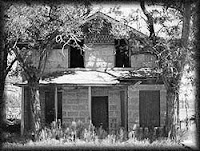
Old Adam's Hotel in Bluff, Utah.
On one particularly memorable occasion, Perry decided he had had enough of our antics. So, quickly scooping us up in his gangly, heavily freckled arms, he strapped us to a gatepost in front of the house, leaving us to bake in the desert heat. We would certainly have succumbed had it not been for our benevolent savior Rose, who heard our terrified cries. After enjoying a few moments of blissful satisfaction while we squirmed, Rose finally liberated us.
At that time, Bobby Goforth was in his early twenties, and was long, lean and handsome. In his blue jeans, cowboy boots, pressed shirt and black hat, he looked every bit the classic western lawman. Bobby’s mother, Mrs. Goforth, was the teacher at Bluff Elementary School, and she took proper care of her handicapped son; always guiding him in the way of the Lord and working hard to keep him safe from temptation. Bobby, however, had a secret.
Across from the Twin Rocks Bar stood the remnants of the Adams Hotel. The lodge had originally been built by Frederick Joseph Adams in the mid-1890s. Adams was just a youth when his parents arrived in Bluff during 1882. After marrying his wife Agnes, Adams built the structure to serve as a trading post. When he died, in order to provide for her family, Agnes turned the it into a hotel and began taking in boarders.
The old building had stood vacant for many years, and its wooden porch, although still intact, had many loose planks. As it turned out, this was the perfect place for Bobby to hide his chewing tobacco, six shooters and caps from the prying eyes of his mother, who worked just around the corner. Bobby could not, however, deceive Barry and me, and we often uncovered his stash to smell the aromatic tobacco and carelessly shoot up his caps. From time-to-time we would stand at a distance while Bobby stared in confusion at his inexplicably diminished cache.
When the tobacco got the best of him, Bobby would swagger into the Twin Rocks Bar with his guns slung low. Standing slightly bowlegged, with his hands firmly clinching the pearl handles of his realistic-looking toys, Bobby would search the room for unsuspecting tourists. When he identified an unfamiliar face, Bobby would look the visitor straight in the eyes and declare, “You have five minutes to get out of town.”
It generally did not take long for stools to scatter and fannies to fly when Bobby made his pronouncement. “Bobby,” the proprietor would say, “you’re killing my business.” Bobby would just grin and order a grape Nehi soda. When he was finished, Bobby would saunter out, waiting for the next opportunity to “give ‘em hell”.
Barry and I were 6 and 7 years old respectively, and we admired Bobby’s pluck, so one day we searched the dusty streets to ensure he was not in sight, strapped on his six-guns, reached into his hidey-hole for a little chewable courage and came up empty. Apparently Bobby had not replenished his stock.
In spite of our tobacco shortage, Barry and I boldly stormed the Twin Rocks Bar. We had seen a few cop shows on television, so while Barry went in first, I backed him up. Quickly identifying an unknown patron, Barry gave him a mean look , grabbed the pistols and shouted, “You have five minutes to get out of town.” I could feel the excitement rising in my young breast. Now I knew the power Bobby felt. “Piss off!” the burley beer drinker said, lifting his glass and drenching us with the remnants of his mug. With that simple movement, our courage was effectively quenched.
Barry and I slunk back to the old porch and replaced Bobby’s valuables. “Shudda had the tobacco,” Barry said. “Yeah” I agreed, wondering what Rose would say when she got a whiff of her alcohol drenched miscreants and worrying that she might reattach us to the post.
With Warm Regards,
Steve, Barry and the Team.
Copyright 2009 Twin Rocks Trading Post




